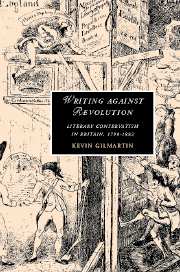Book contents
- Frontmatter
- Contents
- Illustrations
- Acknowledgments
- List of abbreviations
- Introduction: Reconsidering counterrevolutionary expression
- 1 In the theater of counterrevolution: loyalist association and vernacular address
- 2 “Study to be quiet”: Hannah More and counterrevolutionary moral reform
- 3 Reviewing subversion: the function of criticism at the present crisis
- 4 Subverting fictions: the counterrevolutionary form of the novel
- 5 Southey, Coleridge, and the end of anti-Jacobinism in Britain
- Notes
- Bibliography
- Index
- CAMBRIDGE STUDIES IN ROMANTICISM
4 - Subverting fictions: the counterrevolutionary form of the novel
Published online by Cambridge University Press: 22 September 2009
- Frontmatter
- Contents
- Illustrations
- Acknowledgments
- List of abbreviations
- Introduction: Reconsidering counterrevolutionary expression
- 1 In the theater of counterrevolution: loyalist association and vernacular address
- 2 “Study to be quiet”: Hannah More and counterrevolutionary moral reform
- 3 Reviewing subversion: the function of criticism at the present crisis
- 4 Subverting fictions: the counterrevolutionary form of the novel
- 5 Southey, Coleridge, and the end of anti-Jacobinism in Britain
- Notes
- Bibliography
- Index
- CAMBRIDGE STUDIES IN ROMANTICISM
Summary
The anti-Jacobin novel can seem by turns a curiously disengaged fictional enterprise or the most vexed and compelling of counterrevolutionary forms of expression. Disengaged, because by comparison with periodical and pamphlet literature the novel did not address popular radical protest in a sustained way, nor was it significantly integrated with counterrevolutionary organization. This is partly a matter of timing since, as M. O. Grenby has shown in an impressively detailed study, the anti-Jacobin novel was a relatively late entry in the controversies precipitated by the French Revolution, coming into its own towards the end of the 1790s and in the first decade of the nineteenth century with the appearance of dozens of titles with substantial counterrevolutionary themes, including works by Isaac D'Israeli, Elizabeth Hamilton, and Jane West, but then abating well before the intense radical reform agitation of the late 1810s. While programmatic loyalism was by no means absent in these years, and the rise of Napoleon Bonaparte and the emergence of a new generation of parliamentary reformers yielded acute new concerns, the first major phase of the controversy had clearly passed. In identifying the novels treated in this chapter as “anti-Jacobin,” I follow the common practice of recent scholarship, justified in part by the counterpoint between such fictions and the “Jacobin” novels of William Godwin, Thomas Holcroft, Mary Wollstonecraft, and Mary Hays, although I am sympathetic to scholars who object to both categories for sustaining a conservative tendency to mark all protest as foreign and extreme, and for eliding important distinctions among conservative novelists in particular.
- Type
- Chapter
- Information
- Writing against RevolutionLiterary Conservatism in Britain, 1790–1832, pp. 150 - 206Publisher: Cambridge University PressPrint publication year: 2007



